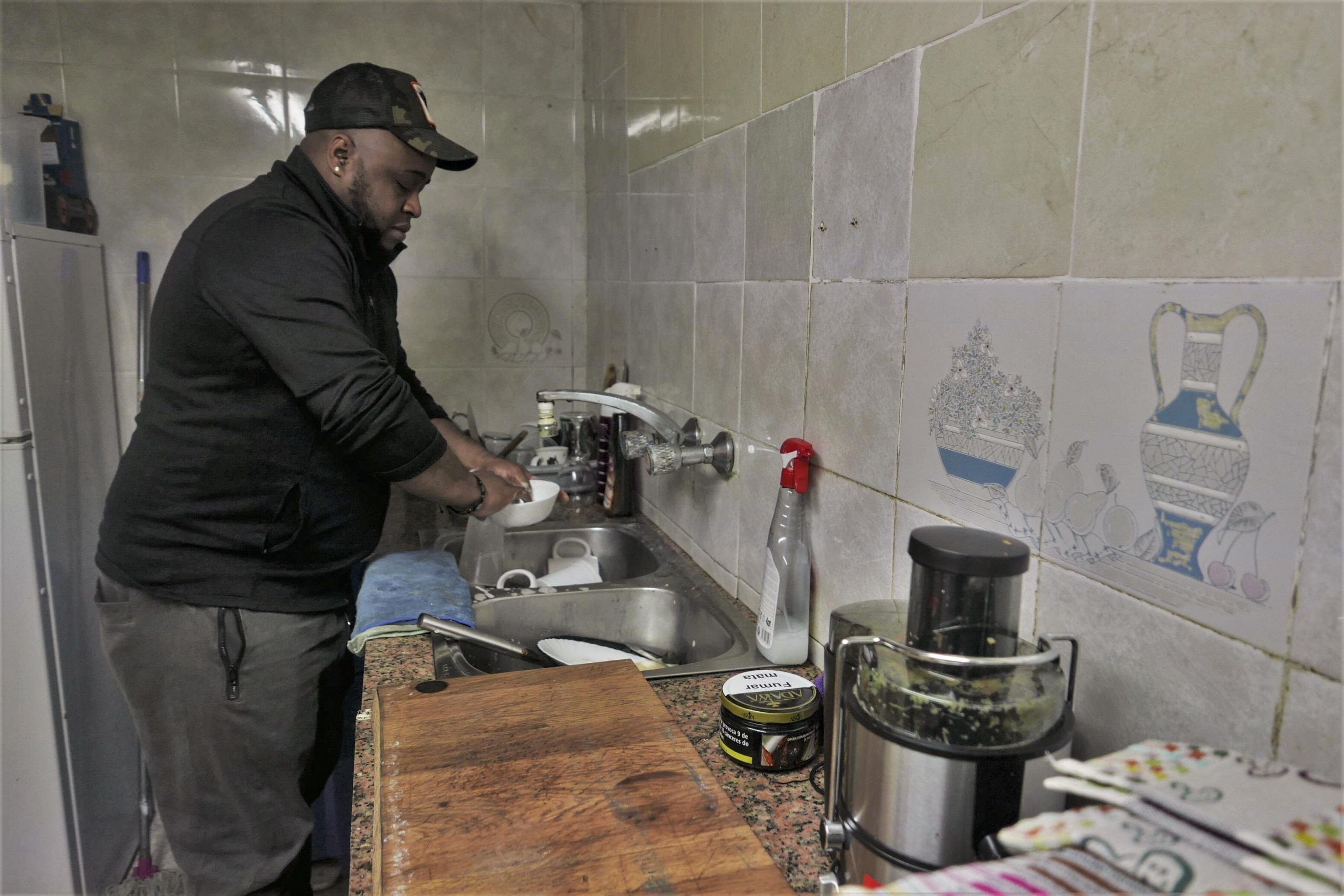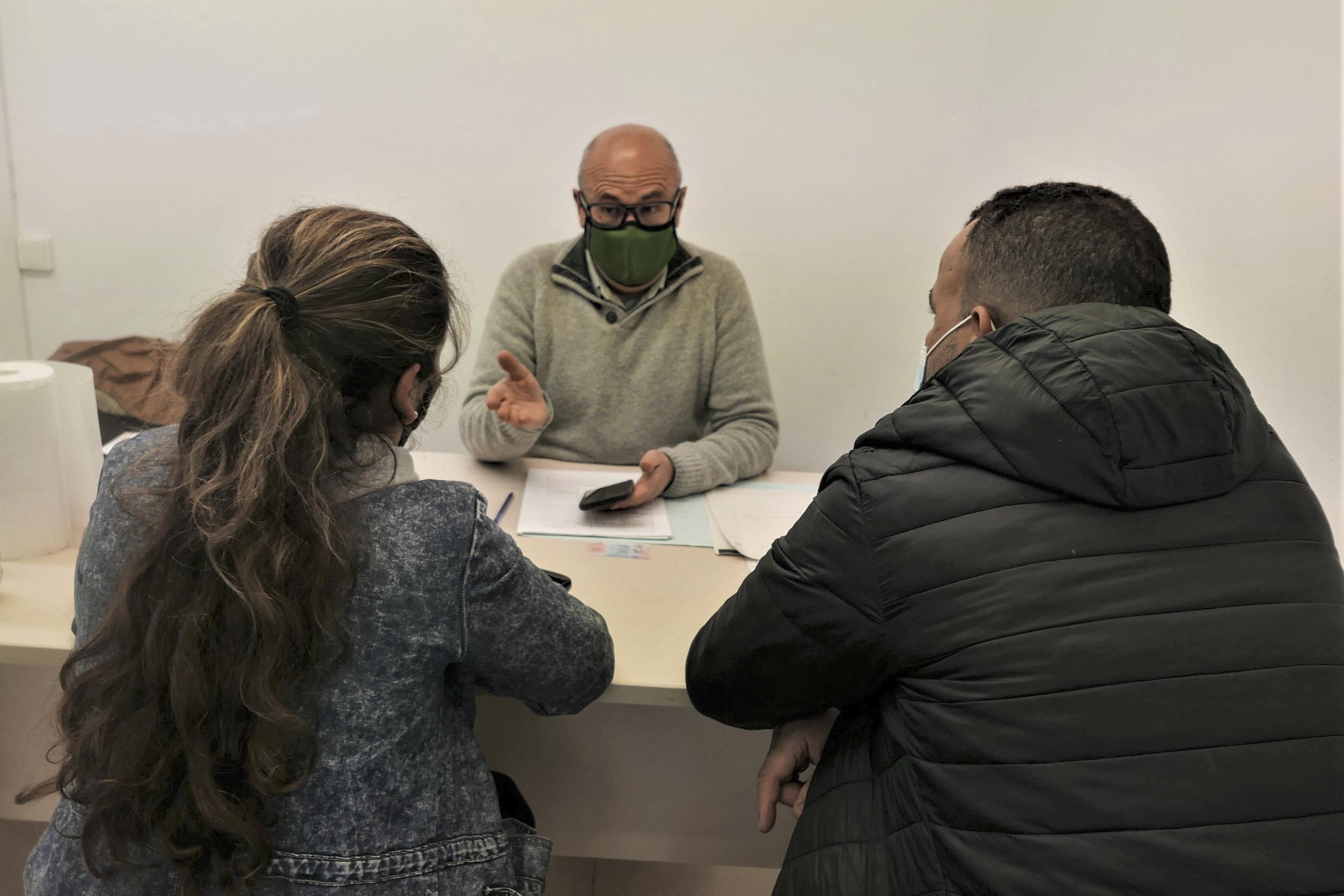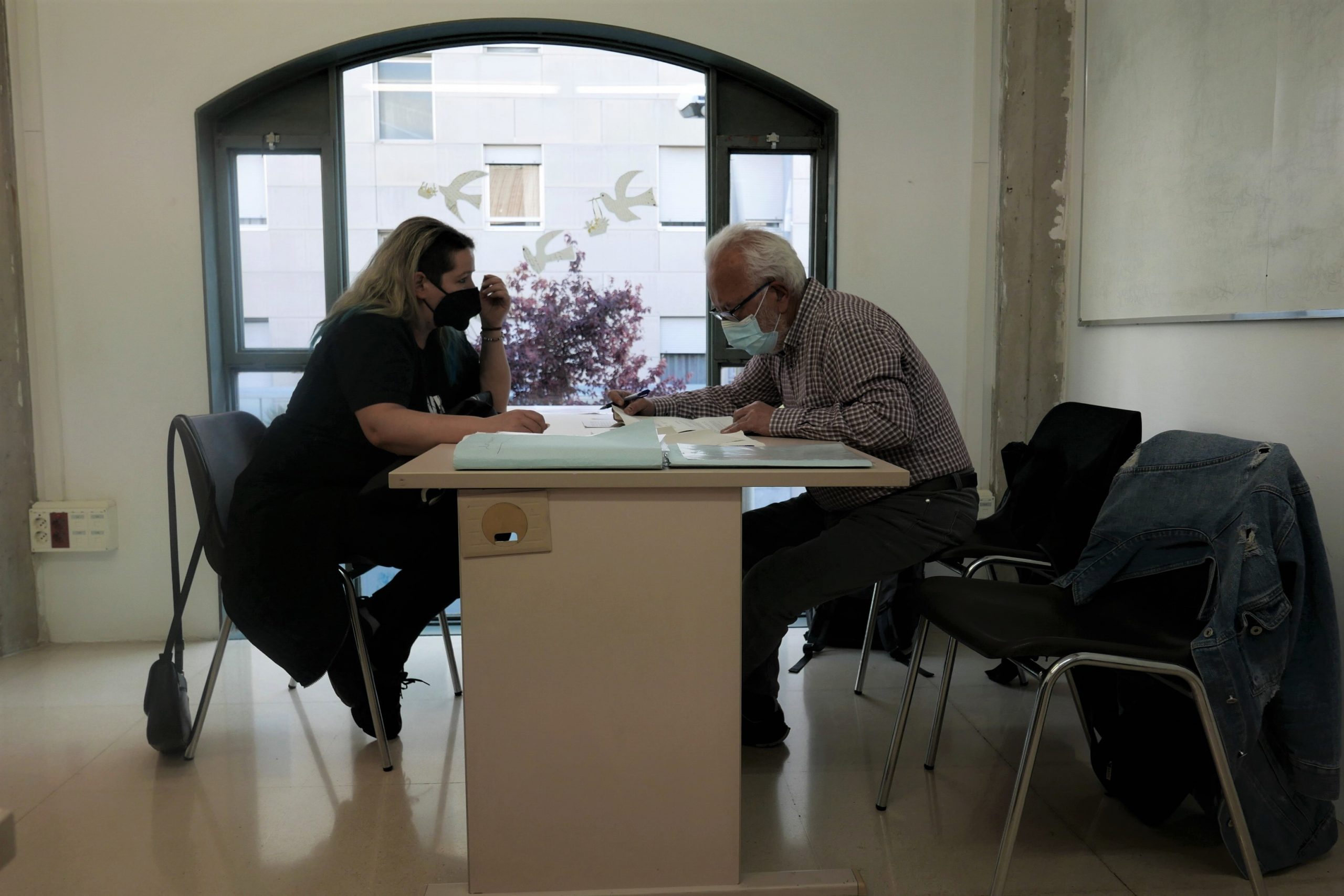Halting evictions and standing up to banks in Spain
Spain’s housing market, largely unregulated and controlled by banks tied to foreign interests, has seen many people evicted from their homes over the years. But those affected have had enough.
Author:
26 May 2021

It is 10am. Sant Adrià de Besòs, a working-class neighbourhood on the outskirts of Barcelona in Spain, slowly wakes up. Around 20 people have gathered in a short and narrow street in front of block number 9 to answer the call from social movements against evictions, including Tenants Union.
Some of those people wear red jumpsuits and sunglasses, others are dressed in black. These are young people and the atmosphere is rebellious. Sant Adrià and Wall Street might be worlds apart, but they are connected by an invisible thread woven by the unregulated globalisation that has taken root in both places.
Edward Antonio, a well-built Dominican in his early 40s, lives in a humble basement in block 9. But maybe not for long. A police patrol is expected to come in half an hour and evict him from the place he has called home for the past three years. This is the third time he has received a foreclosure notice. In the previous ones, volunteer lawyers prevented his eviction with the help of activists who interposed their bodies between the clubs of police agents and marked doors.
Related article:
Young student Alberto* is one of them. “Apartments are the new front line for the liberal bourgeoisie. We have to defend them. Life starts with four walls and a roof,” says Alberto, a member of the Tenants Union.
“I didn’t have enough money to pay the current exorbitant rents, so I bought the key of this house for €3 000,” explains Antonio, sitting in his dining room, a dark place without any windows. With the €3 000 Antonio didn’t just pay for the key of the house but also the right to stay while engaging in a legal battle to keep the house or get an affordable alternative. It is not clear whether he got the key from a previous tenant or a mafia group that specialises in occupying empty apartments. Later on, these groups change the lock and sell the key to families in need.
The 2008 financial crisis hit the Spanish working class hard. Many families were evicted from their houses when they fell behind on mortgage payments. By 2011, 3.5 million apartments were standing empty and many have remained this way since then.
Antonio’s basement belonged to BBVA, the second-largest bank by asset size in Spain, and has since been sold to a vulture fund based in New York. Antonio would like to pay a social rent, but representatives of the fund told him they just want him to leave in exchange for €4 000. “I could pay €150 or €200 per month. But looking at the state of the basement, they should be the ones paying me to stay,” he says, pointing out all the repairs and improvements he has made since he moved in.

Before the outbreak of the Covid-19 pandemic, Antonio alternated temporary jobs as a kitchen assistant and storekeeper. The recession has left him unemployed. He is divorced and he has joint custody of his two children, aged 8 and 13. “When my little son knew that they would kick us out from home, he started crying. I did my best to reassure him,” he recalls.
Antonio presented a good character letter to the judge signed by all the neighbours. “We want him to stay. He is a serious guy,” says José Perez, who is president of the body corporate at block number 9.
A growing problem
Antonio’s predicament is widespread in Spain. Evictions have become a painful reality for thousands of families in the past decade. According to a report by Observatori DESC, a political advocacy and research foundation, titled The Evolution of Evictions 2008-2019: From the Emergency to the Consolidation of a Housing Crisis, more than 600 000 families were evicted from their homes between 2008 and 2019. This means roughly 1.7 million people were affected by these evictions in a country of 47 million.
Even though the economy was growing by 2019, 54 000 families were evicted from their homes. This problem is especially acute in big cities such as Barcelona and Madrid. In the capital, the average price of property is €3 712 per square metre and the average rent is €1 327 a month. This amount is unaffordable for millions in a country where the minimum wage is €1 050 per month.
According to experts, this unprecedented crisis is owing to several factors. “I think that the main reason is the liberalisation of labour policies in the 1980s, which increased dramatically the amount of short-term contracts. When the financial crisis came, all these people lost their jobs first, and their houses later,” says Judit Vall, an economics professor at Barcelona University.
Related article:
“In addition to that, the tourism boom in places like Barcelona, combined with the emergence of online platforms that facilitate renting apartments to tourists, has increased the prices way above salaries and reduced the offer for long-term rent,” adds Vall, who mentions the lack of public housing (less than 2% of homes compared with 24% in Austria or 18% in the United Kingdom) and legislative changes in the housing sector as having contributed to the problem.
The outbreak of the pandemic made the eviction crisis even more visible. The government declared a severe lockdown at the same time, which forced hundreds of families to live on the streets. Under social pressure, President Pedro Sanchez issued a decree in late March last year that put a moratorium on evictions as long as two prerequisites were met: families needed to be in a precarious situation and not have any alternative housing. The decree applies to those who can’t pay their rent or their mortgage.

“The moratorium has been useful in many cases. The problem is that not all judges apply it. And once the eviction has been executed, there is no use appealing. It takes time and the family is already in the street,” says Silvia Badia, the spokesperson of the Tenants Union.
Close to 30 000 families were evicted from their homes in 2020, half the number of the previous year. The activists describe the moratorium as a short-term remedy, not a solution. The decree has been extended several times and it will be in place until 3 August. Once the pandemic has subsided and the government ends its support, the social crisis may worsen and evictions will likely multiply.
Against forced removals
The lack of affordable housing in Spain is such a serious problem that many associations have been created in recent years to defend the victims of evictions, such as the Tenants Union and Sant Roc Platform. The latter restricts its action to Sant Roc, an impoverished neighbourhood close to Sant Adrià made up of social houses with low roofs and built using cheap materials. After its construction, the majority of its inhabitants were Romani people, but recently many Pakistani, Latin American and Moroccan migrants have moved in.
“Historically, the association’s goal was to organise activities in order to stimulate the cultural and social life of the neighbourhood. But in 2012, the eviction crisis was so acute that many came to us looking for help. So the Platform Sant Roc mutated and now we mainly provide advice on this matter,” says Carles Sagues, a veteran social activist turned housing expert.
Related article:
Every Monday afternoon, Sagues and Enric Marin work in a small office in a local government building. In four hours, they assist around 20 families or individuals for free. One of them is Dolores, a middle-aged woman who, for privacy reasons, would only share her first name. “The person who rented my apartment lost it for not paying his mortgage but he never told me, so the police came to my house. It was very stressful.”
Dolores owns a pub nearby and can afford to keep paying her rent. But the new owner is a vulture fund, which gives her just one option: to quit the apartment in exchange for €3 000 euros. “Why don’t they want to rent it? What’s the interest of a foreign fund in a place like Sant Roc?”
Marin, a former bank clerk, says: “These funds sell packages of hundreds of apartments to each other. The decisions are taken thousands of kilometres away. They don’t even know this place.”
Spain is currently ruled by a coalition government formed by a social-democratic and a leftist party. The relationship between the partners is quite tense and the main point of discord is the content of the new housing law, still under discussion.
“We have several demands that clash with their view. We want the current moratorium to become permanent, an increase in public housing and especially a rent-control system for big cities,” says Alejandra Jacinto, member of Parliament for Podemos, the leftist party.
A report by the Spanish Central Bank questions the effects of rent-control in cities such as Berlin or New York, a position shared by many academics who see it as a one of several solutions. “Usually, the result of this policy is that the offer of apartments in the targeted areas contracts, while in the cities around the prices skyrocket,” says Vall, who suggests investing more funds to provide public housing to families in need.
At 10.20pm, Sagues receives a phone call and moves away a few metres from the group in front of block number 9. Antonio and the activists hold their breath. He comes back smiling. The judge has postponed the eviction again. All of a sudden, there is an explosion of cheers and hugs, and they all chant: “We don’t want vultures in our neighbourhoods!”
* Preventing the police from executing an eviction is a felony. As such, Alberto chose not to give his full name.





